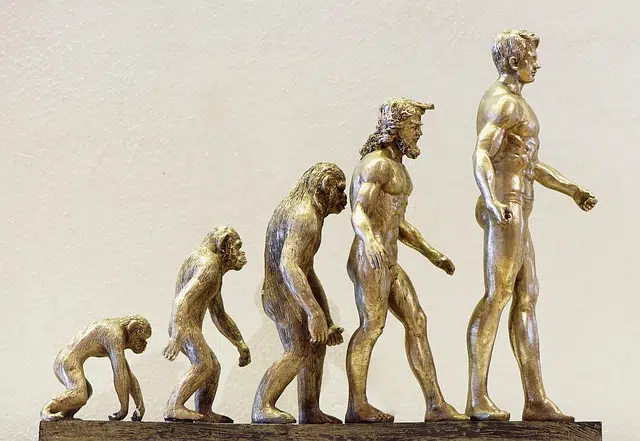
Biological evolution allows the subsistence of the fittest organisms.
The concept of evolution comes from the Latin term evolutio and refers to the verb to evolve and its effects. This action is linked to a change of state or a display or development and its result is a new appearance or form of the element in question.
We can find the term in phrases such as: "We have to wait for the patient's evolution in the post-surgical stage before determining the steps to follow" , "The young Colombian tennis player has shown great evolution in his game" , "The evolution "The business performance was not what we expected and we had to abandon the project."
A process and a movement
Evolution can be understood as a process that some things must go through and that consists of abandoning one stage to move on to another, either gradually or progressively. We can exemplify this in the process of publishing a book, to cite one case, where successive stages appear: an idea arises in the head of a writer, he begins to write some drafts, then he passes the text clean and finally considers it. finished the writing work. Then comes the time to look for a publisher to publish and market the work. At this point, what remains of that idea that arose in the author is a vague memory that bears little resemblance to the final result.
Another way in which the term can be understood is as a synonym for movement , in terms of that curved path carried out by human beings , animals or some objects. That is to say, by analyzing each of the stages of an individual's life, the evolution achieved by him or her could be known or understood.
biological evolution
We can also talk about biological evolution . This is a process through which species change over time (modifications as generations pass).
This evolution generates an alteration in the genetics of a population that could lead to the adaptation of the species to a new habitat or the emergence of a different species.

Charles Darwin is considered the father of the theory of evolution.
Darwin's theory
When thinking about the term evolution, the first name that comes to mind is Charles Darwin , however it is important to clarify that he was not the first to talk about the evolutionary question of species, nor even the one who coined the term. Charles himself mentioned a dozen authors and scientists who had preceded him whose studies were fundamental for the clear explanation of this theory.
Among these researchers was his grandfather Erasmus Darwin, who in his books "Zoonomia" and "The Laws of Organic Life" made an extensive analysis of the subject. In any case, it is necessary to point out that the great leap towards the conception of evolution on which science is based today was made by Charles, with his theory on Natural Selection .
Evolution and creationism
Within the theory of evolution there are two well-marked lines of thought. One of them is the creationist theory, which is based on the guidelines that religion imposed through its Genesis , where life is possible thanks to the existence of a god and it is he who decides which species are born and how they do it and which ones must die.
The other line is the evolutionist who was inclined to affirm that species changed over time and that their survival depended on each one; and the variations over time and the degree of adaptation that each one presented (the way in which they evolved), were the decisive elements for said survival .
Resources for survival
Darwin's theory of evolution was characterized by imposing new patterns to analyze the evolutionary line of species . His was the first explanation that could be considered credible where the beings best suited to deal with variations in time managed to survive and those who perished were those who could not do so. Those that managed to acclimatize to these changes were species that would show modifications generation after generation , so that future generations were born with the necessary characteristics to efficiently take advantage of the new resources.
At this point an important difference arises between the thinking of some evolutionists such as Lamarck and Darwin himself. The first evolutionists affirmed that the driving force behind species change was the desire for change , called Besoin. For example, the fact that giraffes had a long neck was because they had wanted to reach the tops of the trees and that need or desire had generated the extension of their neck, a characteristic that would be transmitted to their descendants (this theory could not be proven and was discarded). Darwin, on the other hand, said that evolution had to do with adaptation to the new reality ; In the case of giraffes, he said that they were the ones with slightly longer necks that had access to food, and for that reason they were the ones that were able to survive, feeding and reproducing normally.
Mendel's work to understand evolution
It is necessary to clarify that when Darwin showed his theory there was still no knowledge of the laws of genetics and hereditary variation (work carried out by Gregor Mendel), theories that could have helped him significantly to prove his studies. Because, thanks to genetics we can know, for example, that the use or disuse of a member or its usefulness can set important guidelines in the genetic evolution of a species.
Despite this, his theory of evolution is considered the clearest and most obvious way to understand the evolutionary stages of life on our planet.
